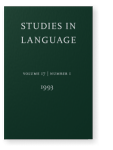Vol. 17:1 (1993) ► pp.135–167
Peculiarities of Passives of Reflexives in German
Cross-linguistically unusual though it is for active clauses with reflexive pronouns as objects to be passivizable, German does permit such passives. Passives with reflexives, widely neglected in German grammar, are examined against the backdrop of purportedly general constraints on the control of reflexive pronouns and on relational interchanges in passivization. As to control, reflexive pronouns in passives appear to be under split control, with semantic and morphosyntactic controllers (active subjects and passive dummy subjects, respectively) not coinciding. As to relational interchanges, passives with reflexive pronouns are prone to lack exemplary subjects despite the presence of potentially subjectivizable objects in corresponding active constructions, with case marking and verb-agreement not necessarily operating in tandem.
Cited by (3)
Cited by 3 other publications
This list is based on CrossRef data as of 18 july 2024. Please note that it may not be complete. Sources presented here have been supplied by the respective publishers. Any errors therein should be reported to them.
